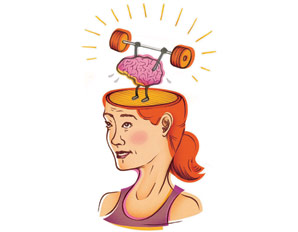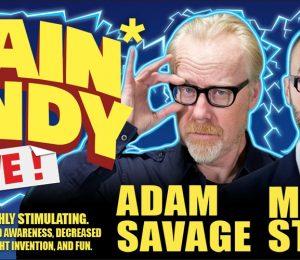
The body undergoes many changes as we age. As kids, humans typically grow taller, get stronger, and learn. Our brain is made up of little things called neurons which connect and essentially “talk” to each other to make our brain function. We start out with thousands. At age three we have approximately 15000. Then by the time we’re adults, we’re down to about half the neurons we were born with. What has happened is that our brain has recognized which areas are being used the most and devoted more of its energy there, cutting back on other areas. As humans age, our thought processes get slower which can have an effect on our language. The words can be harder find. We need extra time to respond to what is being said. We are slower to respond. The thought of losing half our brain by the time we’re adults is pretty depressing…
So how can we combat our aging brain? Good news. Recent research is suggesting our brains can change. If you work hard at strengthening the connections you have, not only might they become stronger, you may even build new connections. So put your brain to the test, and add mental exercises to your physical exercise regimen. Build some new connections! Here are some suggestions on how:
Play word games: Scrabble, Boggle, Scattergories, Catchphrase, Taboo etc. These expand the way you think about letters and words. Notice how after you have played a few rounds, you have improved. That’s your brain in action .
Try to learn a new language: Even the act of trying causes your brain to think differently than you normally would, therefore, exercising your brain.
Read! You’ll be exposed to new words, words you may not hear often and will open your brain to new ideas. Reading stimulates thinking. If you usually read one type of book, try another to give your brain that extra challenge.
Try to remember: Ever notice how we no longer remember phone numbers? How we rely on all our gadgets to remind us of things? Take a step back from the gadgets and focus on remembering. Use mnemonic devices like acronyms to help you remember (for example: Never Eat Shredded Wheat…for North East South West) Challenge your brain to be your best gadget.
About the Author:

Jana Zalmanowitz is a Speech-Language Pathologist at The Speech Therapy Centres of Canada www.speechtherapycentres.com “What I love about being a speech-language pathologist is the opportunity to be creative. No two people I see are the same; therefore they each deserve their own specialized program. Blending treatment goals and techniques with a child or adult’s individual interests keeps my job different and exciting.”
*Header Image: prevention.com


